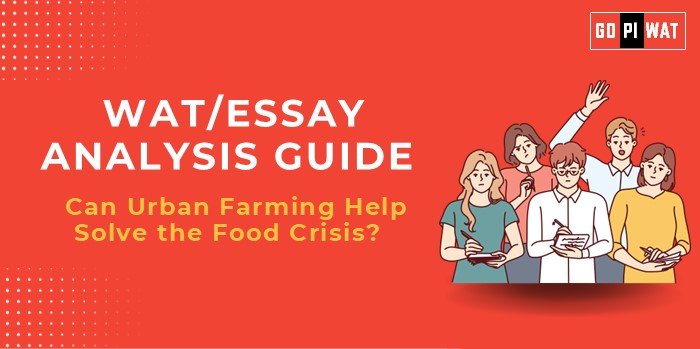📋 Written Ability Test (WAT) Analysis Guide
🌱 Can Urban Farming Help Solve the Food Crisis?
🌟 Understanding the Topic’s Importance
Urban farming addresses two major challenges: food insecurity and unsustainable urbanization. For B-schools, this topic emphasizes innovation, sustainability, and global responsibility.
🕒 Effective Planning and Writing
- ⏳ Time Allocation: 5 minutes for planning, 20 minutes for writing, 5 minutes for review.
- 📖 Preparation Tips: Research case studies, technological advancements, and local implementations.
💡 Introduction Techniques for Essays
- 🔀 Contrast: “While cities consume 70% of global food supplies, urban farming demonstrates potential to reverse this imbalance by producing food locally.”
- 🔧 Solution-Based: “Urban farming is no longer a futuristic concept but a necessity to address growing food insecurity in rapidly urbanizing regions.”
📑 Structuring the Essay Body
- 🏆 Achievements: “Singapore’s urban farms produce 10% of its vegetables, reducing its dependency on imports while optimizing limited land.”
- 🔍 Challenges with Comparative Analysis: “Unlike the Netherlands, where vertical farming thrives, cities in developing nations face barriers like policy gaps and resource limitations.”
- 🔭 Future Outlook: “Integrating urban farming with smart city initiatives could lead to resilient food systems that benefit both urban and rural economies.”
🎯 Concluding Effectively
- ⚖️ Balanced: “Urban farming holds significant promise for mitigating food crises but must complement, not replace, traditional agriculture.”
- 🌍 Global Examples: “Cities like Havana and Amsterdam highlight urban farming’s potential to foster food security and sustainability.”
📚 Sample Short Essays
Balanced Perspective:
“Urban farming bridges gaps in local food production, reducing food miles and enhancing sustainability. However, it cannot fully replace rural agriculture and must function as a complementary system.”
Solution-Oriented:
“Urban farming’s integration with IoT and AI ensures precision agriculture, addressing food insecurity while minimizing resource wastage in urban areas.”
Global Comparison:
“Urban farming’s success in Amsterdam and Havana showcases how policy and innovation can turn urban landscapes into productive food hubs, inspiring global adoption.”


